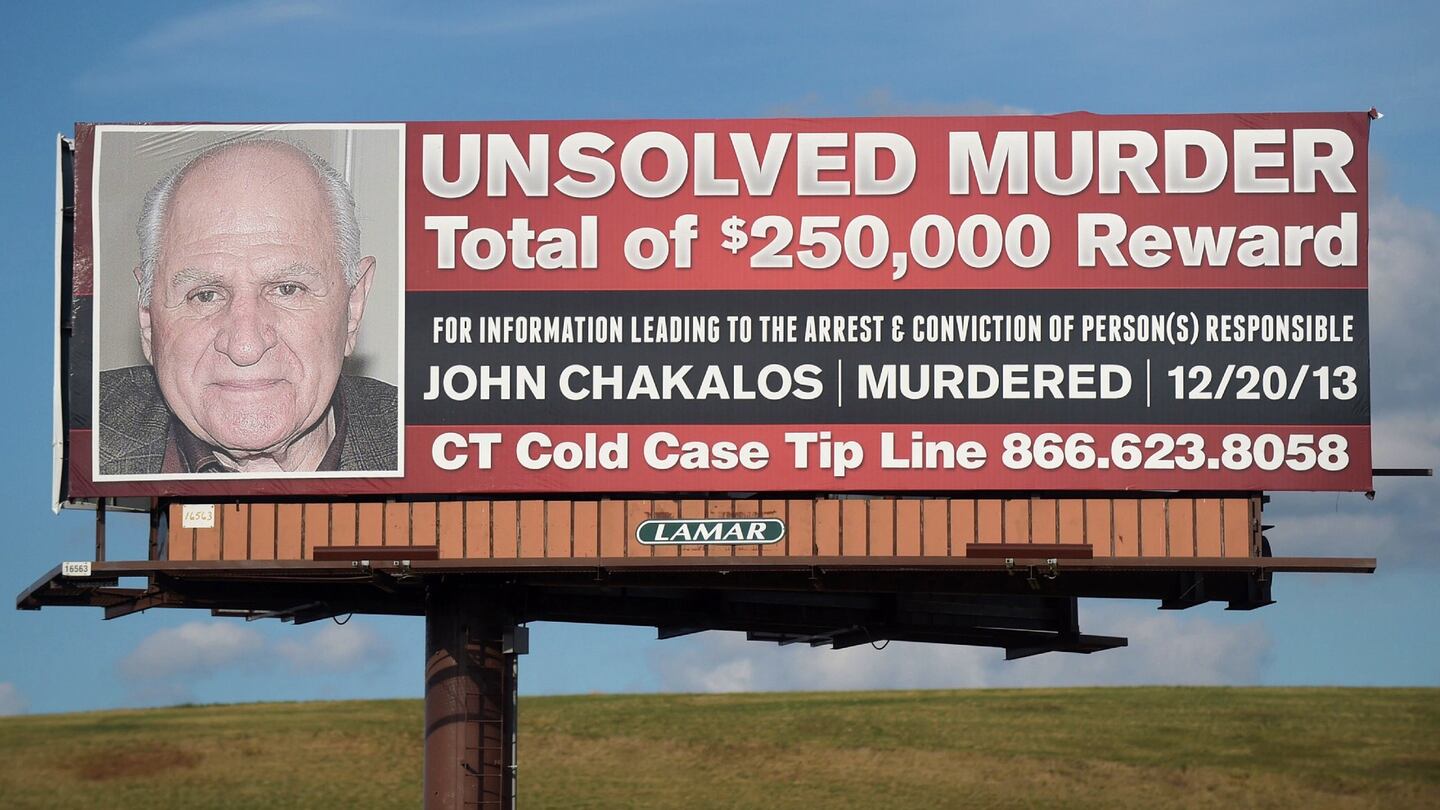BURLINGTON, Vt. — A Vermont man accused of killing his mother during a boating trip in 2016 has been charged with murder on the high seas, as well as fraud, in connection with a scheme to obtain his multimillion-dollar inheritance, federal prosecutors said.
Nathan James Carman, 28, of Vernon, is also accused of fatally shooting his grandfather, real estate magnate John Chakalos, at the older man’s Windsor, Connecticut, home in 2013. Carman has not been charged in Chakalos’ killing.
Linda Carman, 54, vanished Sept. 18, 2016, during a supposed fishing trip off the coast of Rhode Island, according to the U.S. Attorney’s Office for the District of Vermont. Nathan Carman was found a week later, adrift in a life raft.
“The indictment alleges that both killings were part of a scheme to obtain money and property from the estate of John Chakalos and related family trusts,” prosecutors said in a news release. “The indictment further alleges Carman attempted to defraud the company that insured his fishing boat.”
The insurance company refused to pay Carman for the loss of his boat, to which he had made suspicious repairs shortly before the trip with his mother. In August 2019, a federal judge sided with the company.
Carman’s aunts have also been fighting to keep him from inheriting his mother’s portion of his grandfather’s remaining fortune.
Linda Carman's estate is worth $6.5 million, records show https://t.co/zlPQwkqBSZ pic.twitter.com/HiylnGRFZ7
— Hartford Courant (@hartfordcourant) February 1, 2017
Carman was arrested Tuesday on an eight-count indictment that included the first-degree murder charge, four counts of wire fraud and three counts of frauds and swindles, federal court records show.
The younger Carman made national headlines after the fateful boat trip on which his mother disappeared. The headlines were as much about his unusual demeanor after his rescue as they were about the tragedy that took his mother’s life.
According to his family, Nathan Carman is on the autism spectrum. He previously was diagnosed with what was once called Asperger’s Syndrome, a high-functioning form of the condition.
Carman told reporters after his rescue that he was with his mother on his 31-foot fishing boat, called the Chicken Pox, when he heard unusual noises coming from the engine. He said the vessel took on water so quickly that he could not keep track of his mother’s whereabouts.
Carman was able, however, to stock the life raft on which he survived with food and water before the boat sank.
‘A strained relationship’
Carman first came under suspicion when authorities learned that he and his mother had different ideas of how far out they would be going for their nighttime tuna fishing trip. The pair, who authorities said had “a strained relationship,” used fishing trips as a way of bonding with one another.
ABC News correspondent Linzie Janis wrote in February 2017, however, that Linda Carman had told at least one friend that she and her son were going fishing near Block Island, about 20 miles from the Rhode Island shore. Linda Carman refused to go farther into the ocean than that, her friend told authorities.
When Nathan Carman was found by the crew of a Chinese cargo ship, the Orient Lucky, he was floating 100 miles from shore.
@USCG speaks to 22-year old Nathan Carman about what happened at sea
— Scott McDonnell (@ScottMcDonnell_) September 27, 2016
His mother, Linda Carman not the life raft
Listen to the #AUDIO here : pic.twitter.com/7TlaHJMS7i
The indictment in the federal murder case, which was unsealed on Tuesday, states that Nathan Carman told his mother they would be fishing in the immediate vicinity of Block Island. Linda Carman left a “float plan” with friends in which she indicated she expected to be home by noon the next day.
Mother and son departed from Ram Point Marina in South Kingston, Rhode Island, around 11:13 p.m. on Sept. 17, 2016.
Unbeknownst to Linda Carman, at least one witness saw her son drilling holes in the boat, which he had bought in 2015, just hours before their trip, ABC News reported. According to court documents, police and prosecutors later determined that he had removed two forward bulkheads, as well as some trim tabs from the transom of the boat’s hull.
Authorities believed that the repairs could have rendered the boat unsafe, or that Nathan Carman altered the boat to make it easier to sink after killing his mother.
On Sept. 18, when the pair failed to return from their trip, the U.S. Coast Guard began a search-and-rescue mission that lasted until Sept. 24, when authorities determined Linda Carman could not have survived in the water for that long.
Her body has never been found.
Nathan Carman thanks public for prayers, boat crew for rescuing him. pic.twitter.com/izmZ94025h
— Mikaela Porter (@mikaelaportersc) September 28, 2016
“After being picked up by the Orient Lucky, Nathan Carman made false statements to the Coast Guard, to law enforcement investigating the disappearance of Linda Carman, and to others about what happened to Linda Carman and about what occurred on the Chicken Pox,” the indictment reads.
The month after his mother’s presumed death, Carman filed an $85,000 insurance claim with Boat U.S. for the loss of his boat. According to prosecutors, he maintained his previous false claims about the accident and added new details.
Boat U.S. denied the claim in January 2017.
That July, focus turned to Chakalos’ 2013 murder.
A plot begins to take shape
Chakalos, 87, had made his fortune — an estimated $7 million — through real estate ventures that included the building and rental of nursing homes. His fortune was slated to be divided upon his death among his four daughters: Linda Carman, Elaine Chakalos, Charlene Gallagher and Valerie Santilli, who is the executor of his estate.
During the estate planning process, Chakalos created a number of trusts, including one called the Chakalos Family Dynasty Trust. According to federal court documents, the Dynasty Trust was designed to provide distributions to each daughter, as well as to distribute assets to trusts in the names of each daughter.
Additional assets Chakalos possessed would go into the dynasty trust and the individual trusts upon the patriarch’s death.
“Under the terms of the trusts, the daughters had some control to name the beneficiaries of their trusts,” the indictment states. “Under the terms of the trusts, the trustees, Larry Santilli and Paul Sterczala, had the power to decide whether to make distributions from the Dynasty Trust and from the daughters’ trusts receiving funds from the Dynasty Trust.”
Beginning in 2012, Nathan Carman began asking detailed questions of his grandfather’s lawyer and financial advisor about the operation of the trusts. He also began questioning his own financial interests in his grandfather’s assets, prosecutors allege.
By the following year, Chakalos had set up two bank accounts to which his grandson had access: One held $150,000 to go to Carman’s college education and the other contained $400,000, with the beneficiaries listed as both Linda and Nathan Carman.
“During 2012 and 2013, Nathan Carman spent significant time with his grandfather, John Chakalos, and attended various business meetings,” according to the indictment. “Chakalos convinced Linda Carman to designate Nathan Carman as the beneficiary of her trust from the Dynasty Trust.
“During this period, Chakalos paid for Nathan Carman’s personal expenses, including a truck and an apartment.”
Read the federal indictment against Nathan Carman below.
Nathan Carman graduated from high school in 2012 and enrolled in community college. That year and the next, however, he failed to complete most of his courses.
It was in 2013 that authorities believe Carman began devising his plan.
“As a central part of this scheme, Nathan Carman murdered John Chakalos and Linda Carman,” prosecutors wrote. “He concocted cover stories to conceal his involvement in those killings. As part of his cover-up, Nathan Carman misrepresented his involvement in and responsibility for those deaths to law enforcement, to his family, to others who made inquiries about the deaths and their circumstances, and to others who challenged his cover-up or challenged his rights to his grandfather’s assets.”
That November, Carman, who lived in an apartment in Connecticut at the time, used the address of a home his grandfather owned in New Hampshire to acquire a New Hampshire driver’s license, the indictment states. He also registered his truck in New Hampshire.
Days later, on Nov. 11, 2013, he used his new driver’s license to buy a Sig Sauer rifle.
‘A time bomb waiting to go off’
A search warrant affidavit in the Chakalos murder indicates that it was just nine days later that Elaine Chakalos went to her father’s home at 52 Overlook Drive in Windsor, to check on her father. When she arrived, she found John Chakalos dead of a gunshot wound to the head.
According to the affidavit, which was obtained by the Journal Inquirer in Manchester, Connecticut, detectives from the Windsor Police Department and the Connecticut State Police spent the next several months investigating the fatal shooting. At the end of that time period, they had a suspect in mind.
Nathan Carman.
Carman, who had dinner with his grandfather the night of Nov. 19, was the last person to see Chakalos alive. Linda Carman told police she was supposed to meet her son at 3 a.m. the next day for a trip to Rhode Island.
He never showed up, and he did not answer his cellphone, the affidavit states. Linda Carman said she went home to Middletown.
Nathan Carman’s details of his whereabouts the night of the murder contained multiple inconsistencies, according to prosecutors. The most significant was a period of just over an hour on Nov. 20 — from 2:57 a.m. to 4 a.m., when he called his mother — in which neither his police interview, his cellphone records nor video surveillance could account for his location or actions.
The inconsistencies were even more suspicious after authorities learned that Carman had thrown out his computer hard drive, as well as the GPS unit he was using the morning his grandfather was slain.
A doctor who consulted on the case said that if Carman did have Asperger’s Syndrome and was involved in the crime, he likely would have “researched via computer whatever information that could have assisted him in carrying it out.”
“During the course of this investigation, investigators learned from various sources that Nathan Carman was capable of violence when his coping mechanisms were challenged,” the affidavit states.
Carman had several “episodes” of violence while in high school. There was an even more disturbing allegation from his childhood, however.
“Family members … made investigators aware of an incident in which Nathan, as a child, held another child ‘hostage’ with a knife,” authorities wrote.
Carman pointed detectives to several vintage rifles his grandfather kept in his home as souvenirs from his service during World War II. Two of them were .308-caliber rifles, the same caliber of the bullets that killed Chakalos.
He failed to mention, however, that he had bought a Sig Sauer rifle days before the murder. Like the others, that rifle was a .308-caliber gun.
A search warrant executed at Carman’s apartment revealed additional weapons and ammunition, though in his police interview, Carman had downplayed his familiarity with guns, the warrant states.
One of Carman’s neighbors described the young man as a “time bomb waiting to go off,” while another called him “murder boy” based on his own interactions with Carman, according to police.
>> Read more true crime stories
The attorney for the three sisters of Linda Carman released this statement to @NBCConnecticut #nbcct pic.twitter.com/JOWfV5tl8L
— Jill Konopka (@jillkonopka) July 17, 2017
Carman’s own family members, many of whom suspected him in his grandfather’s killing, were so afraid for their safety that they hired armed private security details.
Detectives sought a warrant for Carman’s arrest in July 2014, but it was not granted. The murder case remained open.
Meanwhile, Carman inherited $550,000 from the trusts his grandfather had set up and moved to Vermont. According to his federal indictment, he was mostly unemployed for the next several years.
“By the fall of 2016, he was low on funds,” the indictment states.
That Sept. 17, he and his mother set out for their fishing trip. Linda Carman never returned.
Nathan Carman is being held without bond pending a detention hearing next week, according to court records.
©2022 Cox Media Group












